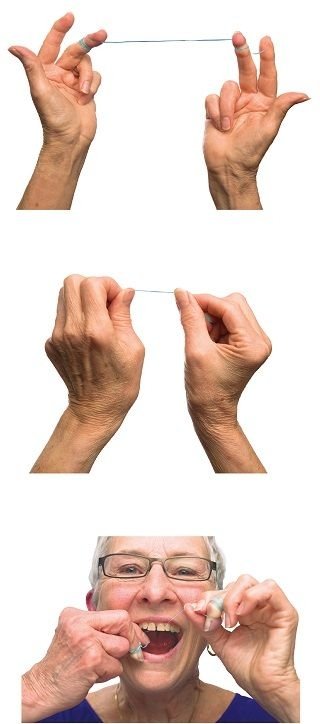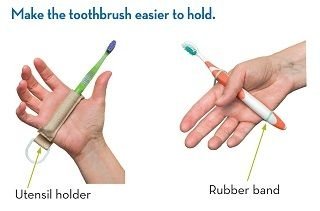Taking Care of Your Teeth and Mouth
On this page:
Healthy teeth and gums make it easy for you to eat well and enjoy good food. Several problems can affect the health of your mouth, but good care should keep your teeth and gums strong as you age.
Tooth Decay
Teeth are covered in a hard, outer coating called enamel. Every day, a thin film of bacteria called dental plaque builds up on your teeth. The bacteria in plaque produce acids that can harm enamel and cause cavities. Brushing and flossing your teeth can prevent decay, but once a cavity forms, to avoid further damage, a dentist must fix it with a filling.
Use fluoride toothpaste to protect your teeth from decay. If you are at a higher risk for tooth decay (for example, if you have a dry mouth because of a condition you have or medicines you take), you might need more fluoride. Your dentist or dental hygienist may give you a fluoride treatment during an office visit or may tell you to use a fluoride gel or mouth rinse at home.
Gum Disease
Gum disease begins when plaque builds up along and under your gum line. Plaque causes an infection that hurts the gum and bone that hold your teeth in place. A mild form of gum disease may make your gums red, tender, and more likely to bleed. This problem, called gingivitis, can often be fixed by brushing and flossing every day.
A more severe form of gum disease, called periodontitis, must be treated by a dentist. If not treated, this infection can lead to sore, bleeding gums, painful chewing problems, and even tooth loss.
To prevent gum disease:
- Brush your teeth twice a day with fluoride toothpaste.
- Floss regularly.
- Visit your dentist routinely for a checkup and cleaning. Tell the dentist about any medical conditions you have and medications you take.
- Eat a well-balanced diet.
- Quit smoking. Smoking increases your risk for gum disease.
How to Clean Your Teeth and Gums
There is a right way to brush and floss your teeth. Every day:
- Gently brush your teeth on all sides with a soft-bristle brush and fluoride toothpaste. Replace your toothbrush every 3 to 4 months.
- Use small circular motions and short back-and-forth strokes.
- Brush carefully and gently along your gum line.
- Lightly brush your tongue or use a tongue scraper to help keep your mouth clean.
- Clean between your teeth with dental floss, prethreaded flossers, a water flosser, or a similar product. This removes plaque and leftover food that a toothbrush can't reach.
- Rinse after you floss.
People with arthritis or other conditions that limit hand motion may find it hard to hold and use a toothbrush. Some helpful tips are:
- Use an electric or battery-operated toothbrush.
- Buy a toothbrush with a larger handle.
- Attach the toothbrush handle to your hand with a wide elastic band.
 See your dentist if brushing or flossing causes your gums to bleed or hurts your mouth. If you have trouble flossing, a floss holder may help. Ask your dentist to show you the right way to floss.
See your dentist if brushing or flossing causes your gums to bleed or hurts your mouth. If you have trouble flossing, a floss holder may help. Ask your dentist to show you the right way to floss.
Dentures
Sometimes, false teeth (dentures) are needed to replace badly damaged teeth or teeth lost because of gum disease. Partial dentures may be used to fill in one or more missing teeth. Dentures may feel strange at first. In the beginning, your dentist may want to see you often to make sure the dentures fit. Over time, your gums will change shape, and your dentures may need to be adjusted or replaced. Be sure to let your dentist handle these adjustments.
Be careful when wearing dentures because it may be harder for you to feel hot foods and drinks or notice bones in your food. When learning to eat with dentures, it may be easier if you:
- Start with soft, non-sticky food.
- Cut your food into small pieces.
- Chew slowly using both sides of your mouth.
Keep your dentures clean and free from food that can cause stains or bad breath. Avoid small crunchy foods that can get trapped under the dentures and hurt your gums. Brush dentures every day with a denture-care product, and soak them in water or a denture-cleansing liquid at night. Be sure to leave them out of your mouth while you sleep to prevent swollen gums.
Dry Mouth
Dry mouth happens when you don't have enough saliva, or spit, to keep your mouth wet. It can make it hard to eat, swallow, taste, and even speak. Dry mouth can increase your risk of tooth decay, fungal infections of the mouth, and cavities. Many common medicines can cause this problem. For example, medicines for high blood pressure, depression, and bladder-control issues often cause dry mouth.
There are things you can do that may help. Try sipping water or sugarless drinks. Don't smoke, and avoid alcohol, caffeine, soft drinks, and acidic fruit juices. Avoid spicy or salty foods. Sugarless hard candy or sugarless gum that is a little tart may help. Your dentist or doctor might suggest using artificial saliva to keep your mouth wet.
Oral Cancer
Oral cancer can start in any part of the mouth or throat, including the tongue. It is more likely to happen in people over age 40. A dental checkup is a good time for your dentist to look for signs of oral cancer. Pain is not usually an early symptom of the disease. Treatment works best before the disease spreads. Even if you have lost all your natural teeth, you should still see your dentist for regular oral cancer exams.
You can lower your risk of getting oral cancer in a few ways:
- Do not use tobacco products, such as cigarettes, chewing tobacco, snuff, pipes, or cigars.
- If you drink alcohol, do so only in moderation.
- Use lip balm with sunscreen.
- Electronic cigarettes (e-cigarettes) are relatively new, and scientists are still learning about their long-term health effects. However, we do know e-cigarette vapor contains cancer-causing chemicals.
Finding Low-Cost Dental Care
Dental care can be costly. Medicare does not cover routine dental care, and some states limit dental coverage under Medicaid. You may want to check out private dental insurance for older people. Make sure you are aware of the cost and what services are covered. The following resources may help you find low-cost dental care:
- Some dental schools have clinics where students get experience treating patients at a reduced cost. Qualified dentists supervise the students. Visit the NIDCR website for a list of U.S. dental schools and other places that offer affordable care.
- Dental hygiene schools may offer supervised, low-cost care as part of the training experience for dental hygienists. Contact your local university or college to see if they have a program available.
- Call your county or state health department to find dental clinics near you that charge based on your income. See a list of state oral health programs.
- To locate a community health center near you that offers dental services, visit www.findahealthcenter.hrsa.gov.
- United Way chapters may be able to direct you to free or reduced-cost dental services in your community. Call "211" to reach a local United Way chapter or visit www.unitedway.org/find-your-united-way.
You may also be interested in
- Finding out how smell and taste can change as you age
- Reading more about diabetes
- Learning more about food and beverage labels
Sign up for e-alerts about healthy aging
For more information about healthy teeth and gums
American Dental Association
800-621-8099
MouthHealthy@ada.org
www.mouthhealthy.org/en
American Dental Hygienists' Association
312-440-8900
www.adha.org
Health Resources and Services Administration Information Center
www.findahealthcenter.hrsa.gov
National Institute of Dental and Craniofacial Research
866-232-4528
nidcrinfo@mail.nih.gov
www.nidcr.nih.gov
www.nidcr.nih.gov/sites/default/files/2018-10/older-adults-oral-health.pdf
This content is provided by the NIH National Institute on Aging (NIA). NIA scientists and other experts review this content to ensure it is accurate and up to date.
Content reviewed:
March 13, 2020


